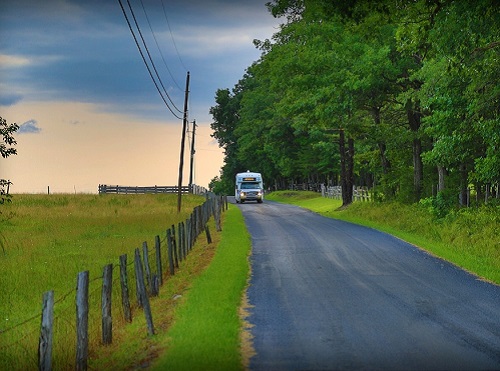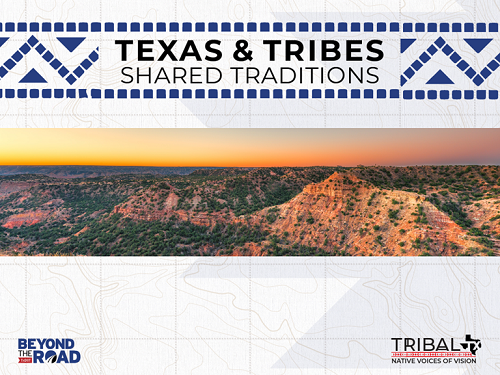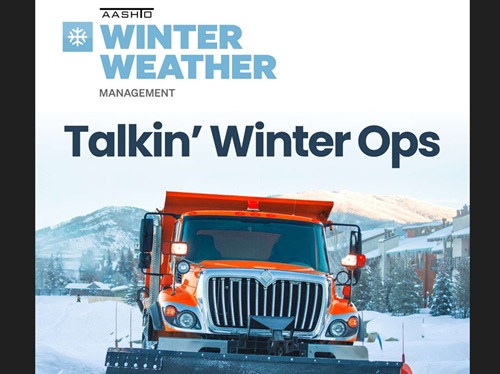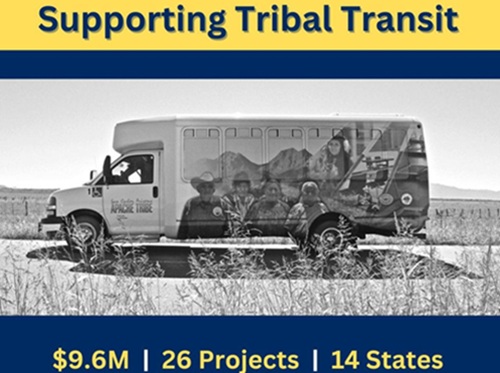The Federal Transit Administration recently issued $9.6 million in grants to 26 American Indian and Alaska Native tribes in 14 states to improve their public transit systems.
[Above photo by FTA]
Those grants – issued through FTA’s Tribal Transit Program – enable tribes to buy transit vehicles, upgrade bus facilities, and expand or improve transit service. The agency noted that the Infrastructure Investment and Jobs Act of 2021 includes nearly $46 million in grant funding over five years for its Tribal Transit Program; an increase of nearly 83 percent.
FTA added in a statement that, to improve this grant program and the technical assistance it offers to tribes, the agency engaged in a consultation process with tribal governments over the last two years.

In response to the input received from that endeavor, FTA said it streamlined and simplified the program application process; including reducing the word count by 50 percent and launching a webpage with explicit instructions about how to apply.
The agency also broadened the type of tribal projects eligible for federal support, including raising the cap on planning projects from $25,000 to $50,000, no longer limiting which eligible tribes can apply for operating assistance and not requiring a local match for any project funded through the Tribal Transit competitive program.
State departments of transportation around the country are also involved in a variety of projects on their own in partnership with Native American tribes, transit-focused and otherwise.
For example, the Idaho Transportation Department joined the Nez Perce Tribe in November 2024 to celebrate the completion of a new roadway interchange at Aht’Wy Plaza on US Highway 95/US Highway 12 near Lewiston; a roadway project that began in May 2023.

Also, in early 2023, to help honor and preserve Native American history, the Texas Department of Transportation highlighted the cultural resources it developed to further bolster its relationship with the 28 federally-recognized tribes connected to the Lone Star state by publishing “Texas & Tribes: A Shared Tradition” to tell the stories of those tribes and their role in Texas history and culture.
Meanwhile, one of the newest “next generation” highway rest areas built and maintained by the Iowa Department of Transportation now also doubles as a museum of Native American culture.
Traveling northbound on Interstate 29 in western Iowa, the agency’s newest rest area is nestled near the Loess Hills just west of Glenwood and highlights the history of the Native American tribes of that area and how they are connected to what archaeologists call the “Central Plains Tradition.”
Concurrently, in September 2023, the Wisconsin Department of Transportation helped create a Tribal Technical Assistance Program or TTAP Center for 65 tribal nations across 30 states along with the Traffic Operations and Safety Laboratory or TOPS Lab at the University of Wisconsin-Madison.
And in January 2022, the Colorado Department of Transportation debuted a documentary called “Durango 550: Path of the Ancestral Puebloans” to show how the agency worked with archaeologists and regional Native American tribes to document, study, and ultimately share the discoveries unearthed near Durango in southwest Colorado.
 Nation
Nation
The Stream by AASHTO: Electrified Roadway Testing
December 5, 2025 Nation
Nation

